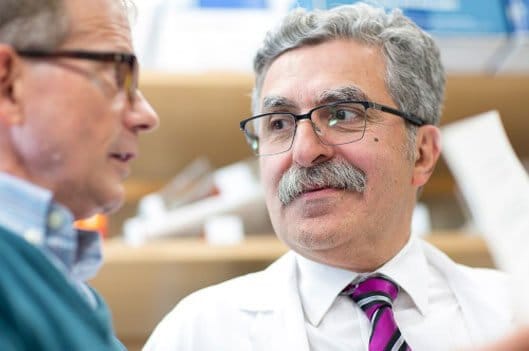 The communities of intestinal microbes found in Parkinson’s disease patients are significantly different than those in people without the disease. Now researchers at Rush University Medical Center and the California Institute of Technology have shown that these differences can trigger and accelerate the disease in those genetically susceptible to developing this neurodegenerative brain disorder.
The communities of intestinal microbes found in Parkinson’s disease patients are significantly different than those in people without the disease. Now researchers at Rush University Medical Center and the California Institute of Technology have shown that these differences can trigger and accelerate the disease in those genetically susceptible to developing this neurodegenerative brain disorder.
In an article published in the December issue of the journal Cell, the researchers report that mice bred to be genetically susceptible to Parkinson’s developed signs of movement disorders after fecal bacteria from patients with Parkinson disease were transferred to mice raised to have no bacteria in their intestine. These findings could lead to new treatments that focus on the digestive system in addition to the brain, according to study co-author Ali Keshavarzian, MD, director of the Rush Division of Digestive Diseases and Nutrition.
Are digestive problems cause or consequence of Parkinson’s?
Parkinson’s and other movement disorders originate deep within the central nervous system when the normal exchange of neurological messages between the brain, nerves and muscles changes. When signals to and from motor areas are not carried out precisely, people experience speech and coordination problems as well as involuntary movements such as tremors, slowness, spasms or tics.
For decades, neurologists have observed that many patients with Parkinson disease had digestive system issues, especially constipation, years before developing being diagnosed. In 2015, Keshavarzian’s published study findings showing that the bacteria colonies living inside a person’s digestive system — known as the gut microbiome — are markedly different in patients with Parkinson’s disease.
However, there are sharp disagreements as to whether these differences in the gut microbiome are a byproduct of the disease or contribute to its progression. In the recent Rush-Caltech study, researchers used mice that had been genetically engineered to produce abnormal amounts of Alpha -synuclein, the protein the builds up in the brains of people with Parkinson’s disease.
One group of these mice had typical amounts of gut bacteria, while others were bred in a completely sterile environment and thus lacked gut bacteria. Both groups of mice performed tasks to measure their motor skills, but only those animals with bacteria in their intestine developed symptoms of Parkinson’s disease. The bacteria-free mice remained healthy, despite having elevated Alpha –synuclein levels.
In subsequent experiments the Caltech researchers worked with Keshavarzian and his former colleague Dr. Kathleen M. Shannon to transplant human microbiome samples from six Parkinson’s disease patients into germ-free mice genetically engineered to develop high amounts Alpha –synuclein, while the digestive tracts in a control group of similar mice were injected with human microbiome samples taken from six healthy people.
“Like the earlier experiments, the mice exposed to bacteria had a drop in motor skills, but those without bacteria were symptom-free,” Keshavarzian says. “But more interesting is that that mice who were transplanted stool from patients with Parkinson disease had more severe signs of Parkinson disease than those who received stool from healthy subjects.”
The Rush collaboration of providing human microbiome samples “really closed the loop for us,” says Caltech microbiologist Sarkis Mazmanian, PhD, lead author of the study report, Gut Microbiota Regulate Motor Deficits and Neuroinflammation in a Model of Parkinson’s Disease, The study’s data suggest that changes to the gut microbiome are likely more than just a consequence of Parkinson’s.
“It’s a provocative finding that needs to be further studied, but the fact that you can transplant the microbiome from humans to mice and transfer symptoms suggests that bacteria are a major contributor to disease,” Mazmanian notes.
Keshavarzian stresses that the study does not prove that gut microbes cause Parkinson’s disease, but rather that they seem to accelerate the disease’ progression in genetically susceptible individuals. “The mice were genetically identical and predisposed to develop movement disorders at some point. But those with the bacteria developed (the symptoms) much faster,” he says. “The bacteria seem to regulate the Parkinson’s-like symptoms.”
 That regulation may occur, Keshavarzian suggests, when gut bacteria break down dietary fiber and produce molecules called short-chain fatty acids (SCFAs). Rush research has shown that low overall levels of SCFAs, and abnormal ratio among three types of SCFAs, can promote the brain inflammation that accelerates Parkinson’s.
That regulation may occur, Keshavarzian suggests, when gut bacteria break down dietary fiber and produce molecules called short-chain fatty acids (SCFAs). Rush research has shown that low overall levels of SCFAs, and abnormal ratio among three types of SCFAs, can promote the brain inflammation that accelerates Parkinson’s.
Targeting the gut to better understand why brain cells die
Why nerve cells in specific regions of the brains of those with Parkinson’s die is not known. But Keshavarzian suggests this new insight into differences in the microbiomes may lead to newer and more targeted therapies.
“Drugs for neurological disorders, understandably, focus on the brain. But if we can also target the gut, perhaps we can come up with new and more effective interventions that could slow the progression of the disease and perhaps even prevent it if we can change the abnormal bacterial community in susceptible individuals before loss of brain cells,” he says.
Rush researchers have been working for several years on a novel idea that intestine might be the source of inflammation in the brain that trigger loss of these cells in the brain.


